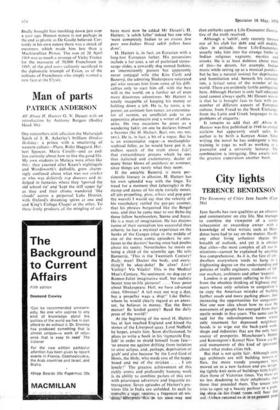Man of parts
PATRICK ANDERSON
All About H. Hatterr G. V. Desani with an introduction by Anthony Burgess (Bodley Head 30s) One remembers with affection the Maharajah Sahib of J. R. Ackerley's brilliant Hindoo Holiday: a prince with a smattering of western culture—Plato, Rider Haggard, Her- bert Spencer, Marie Corelli—and an end- less curiosity about how to live the good life. My own students in Malaya were often like this: they yearned after Keats's nightingale and Wordsworth's daffodils, grew charm- ingly confused about what was not cricket or who was definitely top drawers and in- dulged in fantasies where they 'sported the old school tie' and 'kept the stiff upper lip' as they and their chums wandered 'like clouds' across a perpetual Lake District, with Oxford's dreaming spires at one end and King's College Chapel at the other. To these lively products of the mingling of cul- tures must now be added Mr Desani's H. Hatterr, 'a sahib feller' indeed but one who 'went completely Indian to an extent few pure non-Indian blood sahib fellers have done'.
H. Hatterr is, in fact, an Eurasian with a long-lost European father. His possessions include a fur coat, a set of purloined stereo- scope slides, a cowardly dog named Jenkins, an intermittently present but apparently never conjugal wife (the Kiss Curl) and Banerrji, the admiring Shakespeare-saturated pal who rescues him from some of his diffi- culties only to start him off, with the best will in the world, on a further set of even more disastrous adventures. Mr Hatterr is totally incapable of keeping his money or holding down a job. He is, by turns, a re- porter, an assistant lion-tamer, an extermina- tor of vermin, an unofficial aide to an apprentice pharmacist and a writer of obitu- aries. On two occasions he poses as a wandering fakir; on one he declares himself a baronet (Sir H. Hatterr, Bart, OM, DD, MD, Dm). He is, in fact, a bit of a rogue. But he is an existentialist rogue—a medicophilo- sophical feller, as he would have put it, in endless search of the truth about Life!, that extraordinary process which he sees thus italicised and exclamatory, dealer of many bitter blows of antithesis or contrast, since things are rarely what they seem.
If the amiable Banerrji is more per- sistently literary in allusion, H. Hatterr has his own splendid way with the lingo. To tread for a moment (but falteringly) in the stamp and dance of his style (strictly OHMS, all jets propelling, piste, schuss and pop goes the weevil) I would say that the velocity of his vocabulary rattled the gee-gee counter, that his phrases burgeoned like the Bengal rose, and that he came near to out-Babu-ing those fellow bamboozlers, Sterne and Joyce. He is a man of imagination. He has dreams (some of their surrealism less successful than others); he has a mystical experience on the banks of the Ganges (slap in the middle of one of the most comic episodes); he con- fesses to the doctors' having once had doubts about his sanity. Nevertheless he insists on being a child of the scientific age. He tells Bannerrji, 'This is the Twentieth Century! Body, man! Doctor the body, and every- thing'11 be okey-doke! Be alive! Live! Virility! Vis Vitalist This is the Medical Man's Century. No sentiment, no dog-cat or Romeo-Juliet imaginative stuff, but realistic brutal true-to-life pictures! . . . Your point about Shakespeare. Hell, we have advanced since. Obvious! A. tail may not wag a dog, but a propeller wags a ship!' Like Defoe, whom he would clearly regard as an ances- tor, he believes in money, 'Eat the finest menus! Be landed gentry! Read the daily press of the world!'
At the beginning of the novel H. Hatterr has at last reached England and kissed the stones of the Liverpool quay. Lord Nuffield, he hopes, awaits him. Soon disillusioned, he plans to write a book in his 'rigmarole Eng- lish' in order to shield himself from fate— `to ensure me against drifting from isolation to utter eclipse, and, perhaps, deprivation of grub' and also because `by the Lord God of Hosts, the Holy, who made you of the happy breed and me of the stricken . . . I am lonely!' The greatest achievement of this richly comic and profoundly humane work is its ability to combine pathos of this sort with picaresque adventure and linguistic ex- travagance. Seven episodes of Hatterr's pre- vious life in India are unfolded. In each he `cOnsults a saga; raceives a fragment tit wis- 9deStr;firiterprets4this in his ern - swap and
then embarks upon a Life-Encounter illustra- tive of the truth received.
Although a 'sahib', only recently thrown out of his club for debt and still middle- class in attitude, these Life-Encounters usually take him into the strange limbo of Indian religious vagrants, mystics and crooks. He is at least dubious about most of this—he detests, for example, Indian music while setting up as a musical pundit— but he has a natural instinct for deprivation and humiliation and, beneath his rational. ism, a lyrical sense of the wonder of the world. There are evidently fertile ambiguities here. Although Hatterr is only half-educated (and cannot always spell), Mr Desani sees to it that he is brought face to face with any number of different aspects of European culture, from Freud to the Stock Exchange. from the Latin and Greek languages to the problems of etiquette.
It remains to add that All About H. Hatterr was first published in 1948 to critical acclaim but apparently small sales. Its author is by birth a Kenyan Asian. Since writing the novel he has undergone a long training in yoga as well as working as a journalist and a university lecturer. The combination is intriguing. One awaits with the greatest expectation another book.


































 Previous page
Previous page